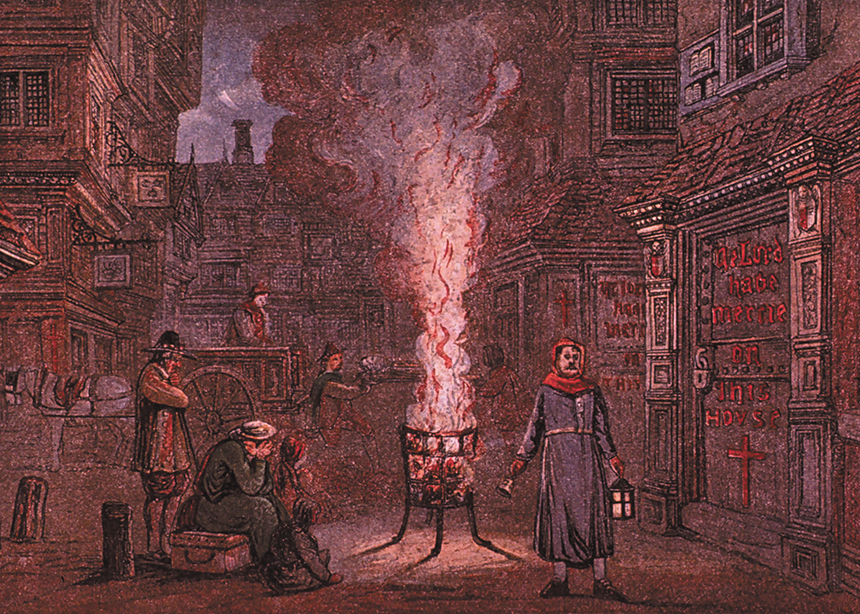Over the last few months, the reality of the climate crisis we are in the midst of has started to strike me in a new and terrible way. As the best-case scenarios for our planet grow more dire and the possibility of achieving even these scenarios grows more remote, it has started to dawn on me that the church is not only faced with the task of working to stop the destruction of our planet.
We now must also confront the question of how we might live and die faithfully on a planet that is dying. As an attempt to do this myself, I tentatively offer four practices for the church that might get us to start thinking about, and living into, how we might continue to be the church on a horribly ravaged Earth.
Hospitality
To be the church, we are going to need to become well practised in an intimate sharing of our lives, resources and homes.
My wife comes from an evangelical church tradition, and one thing that strikes her in the Mennonite churches she’s been part of is the absence of foster children. Foster children were at the heart of the churches she grew up in, churches where there was not much talk about “justice.”
In rightly calling for greater action on the part of government and institutions, have we forgotten that the call of Jesus incarnate in the “least of these” is a call to each of us to respond with flesh and heart? Has our numbing political culture tricked us into believing that having the right “take” on a news story is a meaningful or neighbourly response?
I think we need to start relearning how to practise radical hospitality by making our homes bigger and more crowded, and our nuclear families messier. This is an old practice for Christians, from the early church practice of Christian households keeping a bed and some bread ready for strangers, to the Christian practice of anonymously adopting abandoned children during the Middle Ages.
Are the relational bonds in our communities strong enough for parents to know that, if they die, their children will be taken care of? Are our habits of charity so well ingrained that, in times of desperate scarcity, we will know how to treat the wandering orphan? Hospitality is going to get personal. Are we ready to let God use us to display God’s great and most personal hospitality?
Befriending death
Burying the dead is one of the traditional Christian works of mercy. It was, for example, a task that the early Catholic Worker houses took very seriously before death in North America was institutionalized and hidden away. Famously, one of the charities Mother Theresa’s Sisters of Mercy performed was providing a dignified way for people to die.
There is soon going to be a lot of dying, and, although I have a hard time truly imagining it, it is going to be terrible. We are going to need to remember that, for Christians, the work of loving the dead and dying is as important as, and sometimes more important than, the work of saving lives.
Part of this will mean more fully facing the significance of what it means to be mortal. This will, hopefully, help us to remember that we in the church do not simply serve the hungry, broken, fragile and weak; we ourselves are hungry, broken, fragile and weak. We will only be able to bear the suffering that is to come, and pour out our hearts and lives onto a suffering world and suffering humanity, if we can accept and love our own mortal weakness.
Lament
Before Jesus goes into Jerusalem to be crucified, he laments over the city. He will save the whole world from sin and death, but he knows he will not save Jerusalem from brutal military defeat at the hands of the Romans. On the cross, Jesus quotes the psalmist’s desperate cry: “My God, my God, why have you forsaken me?”
And before Jesus raises his friend Lazarus from the dead, having already proclaimed himself to be the resurrection and the life, he weeps for his friend and his loss.
God’s call to us is to be bound to the world and each other by God’s great love for the world. This will often mean offering up our grieving laments to God.
Concrete acts of lament may be the most important thing that we can do, especially insofar as they might function as a political witness. If there ever was a time when individual action and responsibility might “save the planet,” then that time has passed; it is not household consumption—but a handful of the world’s largest corporations and militaries—that are responsible for the vast majority of emissions, to say nothing of the other ways that they wreck and abuse people and the Earth.
However, as a part of the work of lament, individual and community action can be incredibly important. Suffering through the summer heat because you refuse to turn on the AC will not do anything to prevent climate change, but, as a work of solidarity with, and grieving for, creation, it may be one way that we can continue to worship God on a dying planet.
After companies started strip mining the Amazonian rainforest, Brazilian friends of ours essentially stopped buying and using plastic. They are under no illusions that this will make any difference, but, to be true to their grief, they found that they simply could not use plastic any longer.
This is one way to look at the many wonderful people who continue to work the land in sustainable and abundant ways. I fear that, as the planet becomes more unlivable, even these oases will die. The point of healthy land use may then be less about saving humanity and the planet, and more about the defiant work of lament and repentance—of grieving the loss of the world’s abundance by continuing to work the land abundantly for as long as this is possible.
We must guard against the heroic despair of declaring that, even if humanity seems likely to perish, at least the planet will survive. We must flee a kind of smug knowledge that seems almost triumphant in being “right” about the end of the world. We should turn, instead, to the work of lament, offering our active grief as prayer to God. This grief is too great for us alone, but we believe, as the song goes, that “nothing is lost on the breath of God.”
A new Jerusalem descends from heaven at the end of the vision in Revelation. Jesus’s cry of abandonment upon the cross comes from Psalm 22, which concludes by declaring that the poor will eat their fill, that the Earth will be abundant, and that all people will renounce their dominating ways and turn to the worship of the true God. After Jesus weeps for his friend, he summons him from the tomb with the power of resurrection. God’s love can hold all of love’s terrible anguish borne out in love’s stricken cries of lament.
Trust
When the city of Jerusalem is about to fall to the Babylonian army, the prophet Jeremiah buys a plot of land outside the city walls. The prophetic message is powerful in its simplicity: This land will again be prosperous.
I’ve heard many of my peers wonder whether it’s irresponsible to have children today. I empathize deeply with this sentiment. It fills me with horror and sorrow to think that my three-year-old son may not live past 30, and that whatever years he has after 15 will probably be filled with a degree of suffering and loss that most of us in North America find hard to comprehend.
Jeremiah speaks to us, not to say that there will not be terrible suffering. What we can get instead from Jeremiah is that the work of love goes on, and that it is good work to do because the God who is love is also good. Our species appears likely to be nearing its end, but we can love while time remains, knowing and trusting that love is never vain.
Jesus names us “beloved” and then calls us to abide within his love, a love that is eternally true (John 15:9). To say this is to trust that nothing, not even death, can separate us from the love of God. The promise of resurrection is the promise that, in some deeply mysterious way, a life of love touches and is held safe within that which is eternal.
This is not the comfort of believing that loss and destruction do not really matter because of the life to come. It is the comfort of trusting that the Spirit will continue to summon us all to surrender our hearts to the love that endures, even as the world as we know it ends.
Gerald Ens is doing a PhD in religious studies at McMaster University, Hamilton, Ont. After four years in Hamilton, where he attended Hamilton Mennonite Church, he recently returned to Manitoba with his wife Lisa and son Roger.
For discussion
1. Have you seen evidence in your community that the Earth’s climate is changing? What are the signs in the broader world? How fearful are you about an impending climate crisis? How will your community be affected as temperatures continue to rise?
2. Gerald Ens suggests that we “need to start relearning how to practise radical hospitality.” What does radical hospitality look like? What keeps us from welcoming others into our homes and our country?
3. Ens says that “the work of loving the dead and dying is as important as, and sometimes more important than, the work of saving lives.” Do you agree? Why is it important to befriend death?
4. Lament and repentance are important, says Ens. Why is this a healthy response to the devastation of our ecosystem? What acts of lament can you and your church do to witness to the destruction of the Earth?
5. Do you find yourself in despair over the future of the world? Where do you find comfort and hope? How can we help those who struggle with fear of what the future will bring?
—By Barb Draper
Related stories:
Imperilled world, imperfect choices
Planting trees, nurturing a dream
Revolutionary hospitality
Reflections of creation
Moving beyong ‘climate grief’








Leave a Reply
You must be logged in to post a comment.